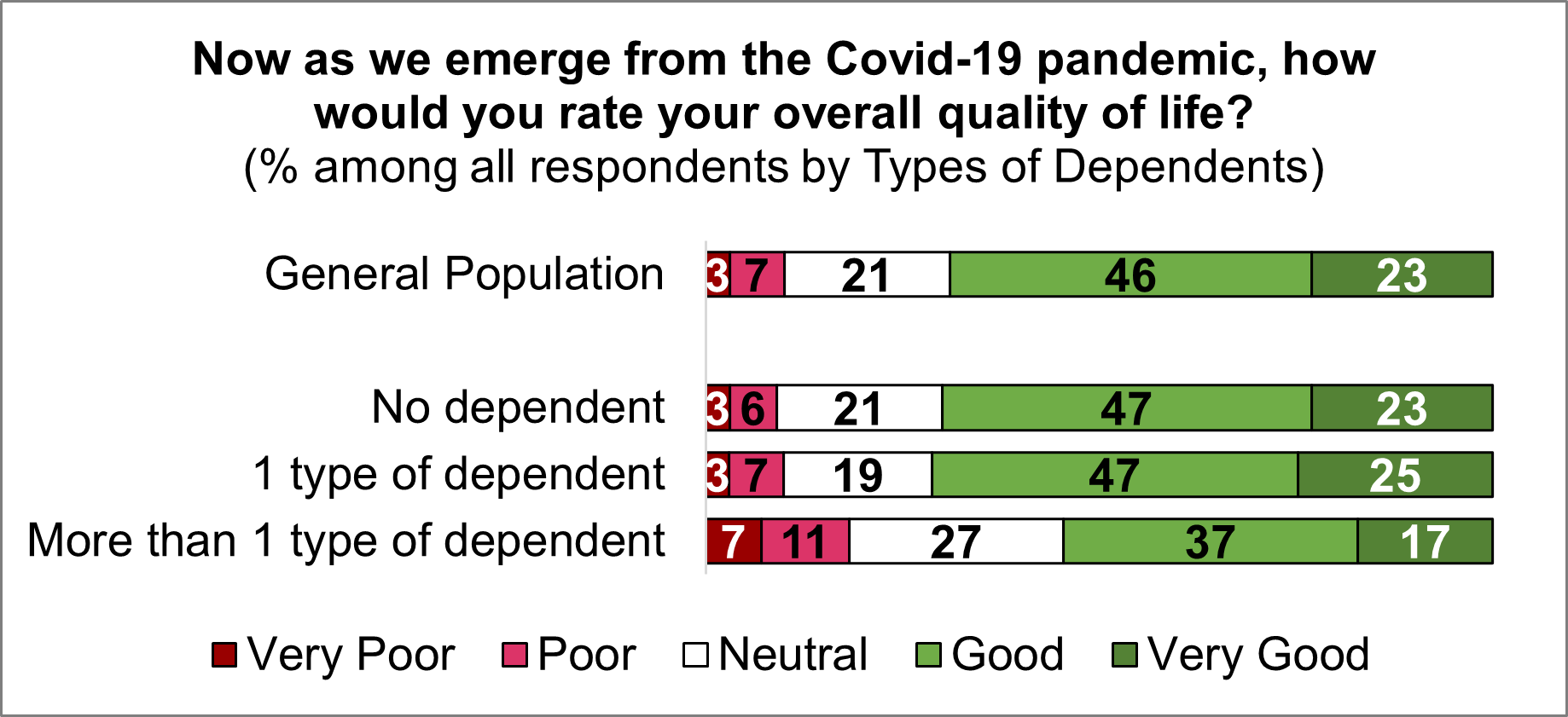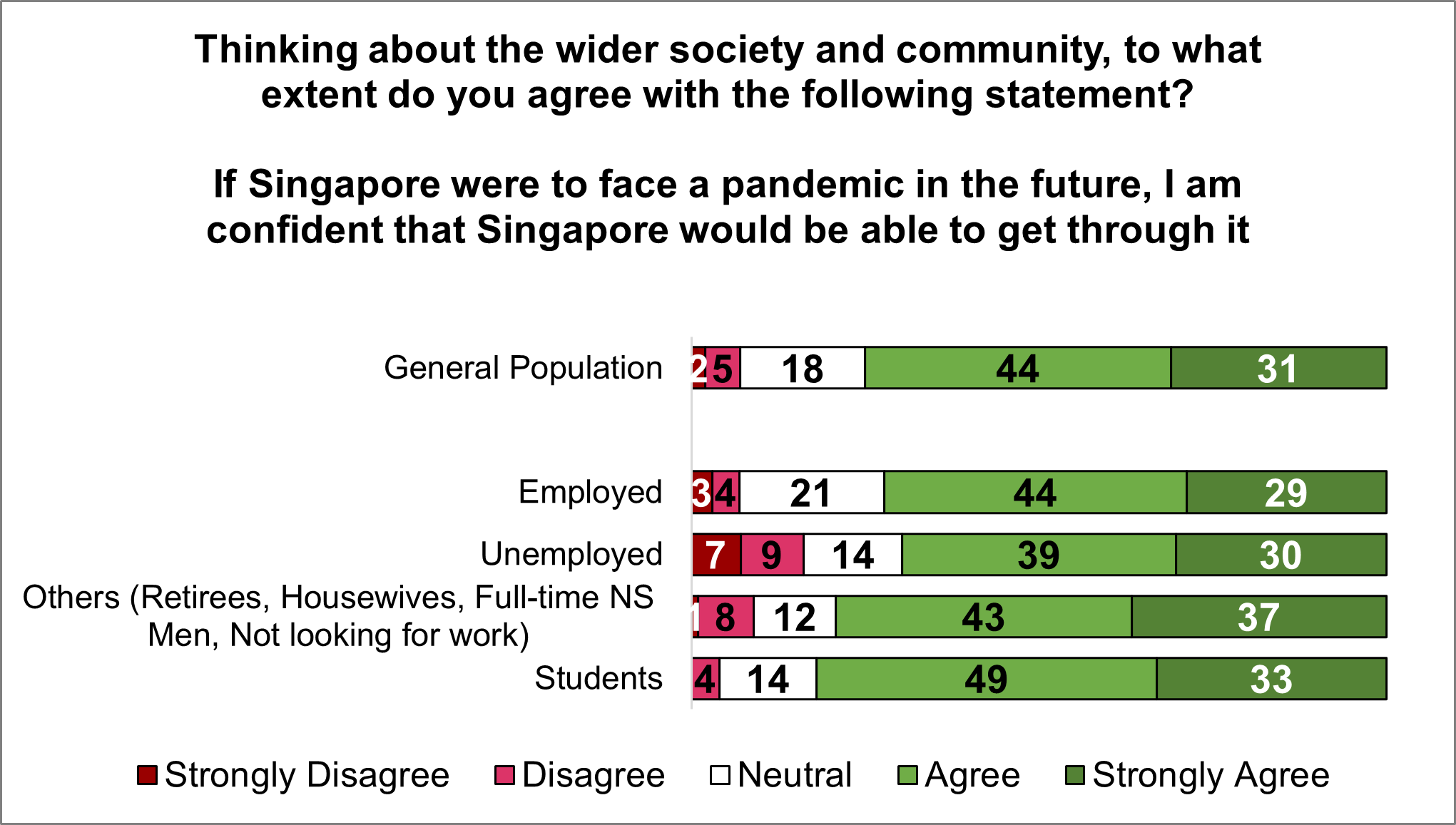Poll by MCI finds 7 in 10 Singapore Residents Positive about Overall Quality of Life Post Pandemic
-
The Ministry of Communications and Information (MCI) commissioned a poll to understand the overall impact of the COVID-19 pandemic on various aspects of life among Singapore residents.
-
The findings, based on the responses of 1,052 Singapore Residents aged 15 years old and above, suggest that social capital was strengthened over the course of the pandemic. Trust between citizens and the Government was strengthened; and most notably, trust among citizens was strengthened too.
-
Significantly, residents reported strong confidence that Singapore, the Government, our healthcare institutions and communities would be able to manage future pandemics well.
Comparing Quality of Life Now Compared to Pre-COVID
-
About 7 in 10 Singapore residents (72%) felt that their overall quality of life was the same or better in 2023, compared to 2019 (pre-pandemic). Even among those (28%) who felt that their overall quality of life was worse compared to before the pandemic, when asked to rate 10 aspects of their current lives, at least 6 in 10 rated them same or higher. This is suggestive of a general recovery.
-
Notably, 77% of respondents reported that family relationships became stronger or remained the same over the pandemic; 82% reported the same regarding relationships with their neighbours; and 71% regarding relationships with friends.
Table 1: Key Aspects of Life
% of respondents that indicated the same or higher rating post-COVID-19, compared to pre-pandemic
My overall quality of life
72
Relationships with my neighbours
82
Being able to access caregiving help for my family
77
Relationships with my family
77
Being able to contribute to society or charitable causes
75
Being able to have a healthy work-life balance
74
Being able to manage my physical health
74
Being able to manage my mental health
72
Being able to cater to my financial needs
72
Relationships with my friends
71
Being able to pursue activities/ hobbies that I enjoy
68
Overall Quality of Life Now
- When asked to rate their overall quality of their lives now as Singapore emerges from COVID-19, nearly 7 in 10 (69%) Singapore residents rated it as “Good” or “Very Good”. Ratings of “Poor or “Very Poor” were generally low across the 10 aspects of life that respondents were polled on.
Table 2: Key Aspects of Life Post-COVID-19
% Good /
Very Good% Neutral
% Poor/
Very PoorMy overall quality of life
69
21
10
Relationships with my family
72
21
7
Relationships with my friends
64
26
9
Being able to manage my physical health
64
24
12
Being able to manage my mental health
62
26
12
Being able to pursue activities/ hobbies that I enjoy
62
25
13
Being able to have a healthy work-life balance
58
29
13
Being able to cater to my financial needs
58
26
15
Being able to access caregiving help for my family
58
32
10
Relationships with my neighbours
53
38
10
Being able to contribute to society or charitable causes
50
38
12
Confidence in Singapore, Key Institutions and Self
- About 7 in 10 Singapore residents expressed confidence in the ability of the country, the Government, the healthcare system, the community, and they themselves to manage future pandemics well.
Table 3: Confidence in Singapore, Key Institutions and Self to Face a Pandemic in the Future
% Agreement
%Neutral
% Disagreement
I am confident that Singapore would be able to get through it.
75
18
7
I trust the Government to know what to do.
71
20
10
I would be mentally prepared to deal with it.
69
23
7
I am confident that Singaporeans would help each other through the pandemic.
69
22
9
I am confident that our healthcare system will be able to manage it.
69
19
12
More Vulnerable Segments
-
A higher proportion of youths aged 15 to 19 years reported a drop in their quality of life (38% for youths vs. 28% for the general population), as well as their ability to manage their mental health (37% for youths vs. 28% for the general population), compared to before the pandemic. This suggests that the impact of COVID-19 restrictions on social activities was more keenly felt by the young, especially teenagers. For example, 40% of youths (compared to 28% for the general population) reported that their relationships with friends were poorer than before the pandemic, and 49% of them (compared to 32% for the general population) felt less able to pursue activities and hobbies.
-
Compared to the general population, respondents with multiple dependents (e.g., elderly seniors as well as children in the household) were more likely to rate their overall quality of life now to be “Poor” or “Very Poor” (18% for those with multiple dependents, compared to 10% for the general population).
 Note: Bar charts may not add up to 100% due to rounding.
Note: Bar charts may not add up to 100% due to rounding. -
Compared to the general population, respondents who were unemployed expressed less confidence about Singapore’s ability to get through another pandemic in the future (16%, compared to 7% among the general population).
 Note: Bar charts may not add up to 100% due to rounding.
Note: Bar charts may not add up to 100% due to rounding. - More information on the methodology behind the poll can be found in the Annex.
Annex
Methodology
This online poll was conducted by RySense from 31 January to 6 February 2023. It had a sample of 1,052 Singapore Residents aged 15 years old and above. Where the sample was not representative of the resident population by gender, age, or race, it was weighted accordingly to ensure representativeness.

